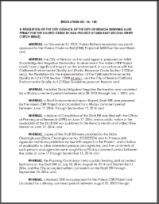 Today the City of Benicia released the final draft of the City Council’s Resolution No. 16-150, A RESOLUTION OF THE CITY COUNCIL OF THE CITY OF BENICIA DENYING A USE PERMIT FOR THE VALERO CRUDE BY RAIL PROJECT AT 3400 EAST SECOND STREET (12PLN-00063)
Today the City of Benicia released the final draft of the City Council’s Resolution No. 16-150, A RESOLUTION OF THE CITY COUNCIL OF THE CITY OF BENICIA DENYING A USE PERMIT FOR THE VALERO CRUDE BY RAIL PROJECT AT 3400 EAST SECOND STREET (12PLN-00063)
This document represents the “wordsmithed” version created during the City Council’s October 4 meeting. This final version has not been previously seen by the public.
At the October 4 meeting, Council members insisted on strengthening the section (now numbered 1. on page 4) that describes the Surface Transportation Board’s decision, clarifying its opinion “that the City has the police power to protect public health and safety so long as it does ‘not discriminate against rail carriers or unreasonably burden interstate commerce.'”
The Council also directed staff to make substantial changes in the format of the staff’s draft version, moving all references to rail-related impacts to a single “informational” item (now numbered 2A-2F on pages 4-6).
The heart of the revised document – findings for denial – are numbered 3-6 on pages 6-9.
NOTE: The 10-page PDF document linked above is large (4.8MB) and slow to download from the City’s website, so be patient. A smaller unofficial version can be downloaded here or you can download the original from Google Drive here.

 After lengthy discussion and significant tweaking on Tuesday night Oct 4, the Benicia City Council unanimously approved a Resolution to Deny Valero’s proposal to build an offloading facility for oil trains. After a long list of whereases, the document indicates “findings” that back up the Council’s unanimous September 20 vote to deny Valero’s permit.
After lengthy discussion and significant tweaking on Tuesday night Oct 4, the Benicia City Council unanimously approved a Resolution to Deny Valero’s proposal to build an offloading facility for oil trains. After a long list of whereases, the document indicates “findings” that back up the Council’s unanimous September 20 vote to deny Valero’s permit.
You must be logged in to post a comment.